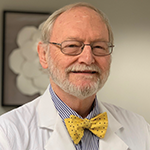 Editor’s note: We at The Rheumatologist are saddened to hear of the passing of Richard Brasington Jr., MD, FACP, MACR. Dr. Brasington leaves a legacy of excellence as an outstanding clinician, educator, scholar and more. One of the many ways that he contributed to our community was as the associate editor of The Rheumatologist between January 2013 and December 2017. His insightfulness, advocacy and dedication to humanistic principles have made him an exemplary role model and mentor for so many individuals. His influence lives on in the goodness he continues to inspire within the hearts of rheumatologists, colleagues, patients, family members and friends everywhere. Below, we republish a conversation with Dr. Brasington from 202o. Click here for some articles featuring Dr. Brasington or written by him in The Rheumatologist. —Bharat Kumar, MD, MME, FACP, RhMSUS
Editor’s note: We at The Rheumatologist are saddened to hear of the passing of Richard Brasington Jr., MD, FACP, MACR. Dr. Brasington leaves a legacy of excellence as an outstanding clinician, educator, scholar and more. One of the many ways that he contributed to our community was as the associate editor of The Rheumatologist between January 2013 and December 2017. His insightfulness, advocacy and dedication to humanistic principles have made him an exemplary role model and mentor for so many individuals. His influence lives on in the goodness he continues to inspire within the hearts of rheumatologists, colleagues, patients, family members and friends everywhere. Below, we republish a conversation with Dr. Brasington from 202o. Click here for some articles featuring Dr. Brasington or written by him in The Rheumatologist. —Bharat Kumar, MD, MME, FACP, RhMSUS
Rheumatologists who are outstanding clinicians and provide consistent, exceptional care to patients are in the spotlight in our Lessons from a Master Clinician series. Here, we present insights from a clinician who has achieved distinction in the field of rheumatology, serving as a role model for colleagues and trainees.
Richard Brasington Jr., MD, FACP, MACR, is emeritus professor of medicine at Washington University School of Medicine, St. Louis, where he also served as the clinical director of the Division of Rheumatology and director of the Rheumatology Fellowship Program for many years. He has been active in rheumatology post-graduate education and has served on the ACR’s Committee on Rheumatology Training and Workforce Issues. In this capacity, he pioneered the Rheumatology Objective Structured Clinical Examination (ROSCE) in rheumatology trainee evaluations. He received the ACR’s Distinguished Fellowship Program Director Award, and was recently named a Master of the ACR. The Dr. Richard Brasington Mentorship Award was established by his rheumatology fellows in 2019, who named him the initial honoree.
TR: In your opinion, what makes for a master clinician?
Dr. Brasington: Experience is the main thing. I tried to teach my fellows how to think through a problem. Start with the most important sign or symptom, generate hypotheses, and narrow them down with the history. A meticulous history can make a big difference. Subtle physical findings can sometimes solve the question; that just takes experience.
Rheumatology is unique in that virtually all of our diagnoses are clinical diagnoses—not based on biopsies or definitive lab tests, but by deciding what is the best explanation for a combination of observations.
TR: Who were some of your clinician role models, & what qualities did you admire in these individuals?
Dr. Brasington: My main mentors were my University of Iowa, Iowa City, Rheumatology Program Director Paul Strottmann, MD, and Division Director Bob Ashman, MD, from whom I learned there is no substitute for taking the time necessary with each patient to figure it out. Time pressure is the biggest enemy of clinical excellence. I learned from Wayne Yokoyama, MD, at Washington University to focus on clinical excellence over everything else. There are so many others who had a great influence on me: Dan Furst, MD, John Sergent, MD, Jim O’Dell, MD, Vibeke Strand, MD, Mike Weinblatt, MD, Virginia Steen, MD, Ron Anderson, MD, and many others. I have continued to find mentors throughout my career.
Time pressure is the biggest enemy of clinical excellence.
TR: What are some habits a fellow in training or junior rheumatologist can incorporate into daily practice to build their clinician skills?
Dr. Brasington: Take time to talk with the patient and listen. Osler said, ‘Listen to your patient; he is telling you the diagnosis.’ Work from clinical findings toward the diagnosis, and use lab results to refine your analysis. It is a huge mistake to start with an abnormal lab result and work from that toward a diagnosis. We diagnose and treat problems in people, not lab tests. Don’t be afraid to listen to the analysis of students, residents or fellows. That has saved me many a time.
TR: What lessons have you learned from patients that have contributed to your own growth as a clinician?
Dr. Brasington: I have learned from patients that they do not expect doctors to listen or to really care. When you do that, it has a powerful effect.
TR: What skills, habits, or experiences have you found most helpful in finding the right diagnosis in medical mystery cases that heretofore had been unsolved?
Dr. Brasington: Learn how to analyze a puzzle. Decide what is the prime issue, then try to explain it. One of the most challenging things is deciding which are the red herrings you can ignore.
It is also critical to guard against getting so locked into a diagnosis that you stop thinking. You must have the humility to realize that you will sometimes be wrong, and be willing to start from scratch in re-analyzing a clinical situation. Don’t hesitate to go back to the very first thing a patient noticed.
It is important to read the records, but I always ask the patient to tell me the story and listen carefully for a clue that might have been missed.
TR: How do you approach the concept of uncertainty when entertaining a diagnosis for a patient?
Dr. Brasington: The legal concept of reasonable degree of medical certainty simply means a diagnosis is more likely than not. I learned from John Atkinson that most rheumatology diagnoses are syndromes rather than diseases. Rarely are we 100% certain of a diagnosis.
The other critical concept is the diagnosis of exclusion. Sherlock Holmes (a character based on a doctor) said something like, ‘How many times have I told you that once you have excluded the probable, what remains, however unlikely, is the answer.’
In other words, find the diagnosis which is most likely, even if not certain, and constantly look for new clues and reassess. I like to say that rheumatology operates on geologic time.
Go to work every day, and pay attention. You can learn something from almost every patient. And learn from your mistakes: The best lessons are learned the hard way.
 Jason Liebowitz, MD, completed his fellowship in rheumatology at Johns Hopkins University, Baltimore, where he also earned his medical degree. He is currently in practice with Skylands Medical Group, N.J.
Jason Liebowitz, MD, completed his fellowship in rheumatology at Johns Hopkins University, Baltimore, where he also earned his medical degree. He is currently in practice with Skylands Medical Group, N.J.
